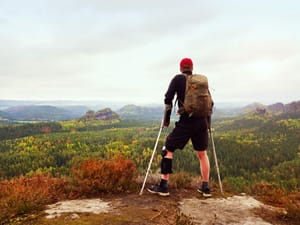We're in the early stages of launching Able Innovation, and we invite you to join us on this important mission.
Our goal is simple: connect people with disabilities to social, recreation, and physical activity opportunities while helping organizations reach this vibrant but underserved community.
Is this site for me?
Whether you have a disability, care for someone who does, or simply recognize that aging eventually touches us all, accessibility affects everyone. One in four adults reports having a disability today, but when we include families, caregivers, and support networks, disability touches one in three households. The solutions we create today will benefit us all tomorrow.
The Undeniable Benefits
Emotional Health: Research shows that recreational activities reduce symptoms of depression and anxiety while combating isolation. For people with disabilities, these activities foster independence and self-esteem while challenging social stigmas.
Medical Impact: Regular activity improves longevity and reduces chronic disease risk for everyone. For the disability community, these benefits are even more crucial—reducing secondary complications like chronic pain, pressure ulcers, and respiratory issues.
Economic Impact: Active adults spend significantly less on healthcare. Studies show even minimal increases in physical activity among Medicare beneficiaries could save billions in annual expenditures.
Quality of Life: Beyond longevity, active adults report higher happiness levels and show greater resilience as they age. For people with disabilities, this resilience is critical for maintaining independence throughout life.
The Barriers We Face
Despite these benefits, significant engagement barriers exist:
Digital Access Challenges: Hidden information about adaptive programs and lack of fields to specify accessibility needs during registration create the first hurdle. These digital barriers, highlighted by Global Accessibility Awareness Day, block participation before people even reach the physical space.
Communication Hurdles: Most organizations lack a user-centric communication mindset, instead offering a patchwork of websites and manual processes (e.g. emails and phone calls) that create extra steps and frustration.
Psychological Barriers: When systems require "special inquiries," they create perceived exclusion. These friction points can trigger fear of rejection or anxiety about potential stigma.
Organizational Challenges: Organizations struggle with inefficient operations, fragmented communication channels, and high costs of maintaining outreach systems that often rely on manual processes.
Our Approach
As we embark on this journey, we'll address these challenges through:
Research: Developing insights through thought leadership, partner studies, and real-world case stories showing what works.
Consulting: Helping organizations create seamless experiences for the disability community.
Technology: Building solutions that effectively bridge the gap between people with disabilities and organizations offering recreation opportunities.
Join Us
Subscribe to follow our progress as we build a more accessible and engaging future for everyone. Whether you're personally affected by disability today or recognize its universal relevance to our aging population, the innovations we explore will benefit us all.


